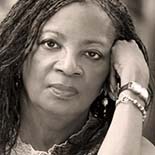 Colleen J. McElroy (October 31, 1935 – December 12, 2023) was an American poet, short story writer, editor, memoirist. She graduated from Kansas State University, and from the University of Washington with a Ph.D. She was a Professor Emeritus at the University of Washington, where she was the first African-American woman to serve as a full-time faculty member. From 1995 to 2006, she edited The Seattle Review, first in the role of Poetry Editor, then as Editor-in-Chief.
Colleen J. McElroy (October 31, 1935 – December 12, 2023) was an American poet, short story writer, editor, memoirist. She graduated from Kansas State University, and from the University of Washington with a Ph.D. She was a Professor Emeritus at the University of Washington, where she was the first African-American woman to serve as a full-time faculty member. From 1995 to 2006, she edited The Seattle Review, first in the role of Poetry Editor, then as Editor-in-Chief.
LOHAR’S WIFE
Colleen J. McElroy
Colleen J. McElroy
In a world where all the heroes
are pilots with voices like God
he brought her a strand of some woman’s
hair to wear on her wing.
She looked sideways at the ground
silent behind the cloudy film covering
her eyes knowing she would be his
forever. They cruised the city nights
each one spiraling away from the other
but always coming home to gather stories.
Dark streets bright tavern lights drunks
filled with beer in the gutters.
The flicker of stars shaped like a hunter’s
arrow bent stars that twinkled like babies’
eyes. No babies for them. She was an outcast.
He a loner. A perfect pair.
Winters had made him wise
and he avoided the single nests of summer.
He told her about things she could see.
How the dismal cover of clouds roils and explodes
and the ground aches like an old woman’s knee.
How wood rots against the tide
good for hunting grub.
How to fade and fall back into the wind.
He translated her pulse
into near-language. Their poetry so personal
even Peterson’s Field Guide could not tap it.
Only a stray hunter saw it.
Shook his head once thinking it a trick
of wind and wing then turned his eyes north
to search for the simple flight
of Brant or Canadian. Those patterns
he could easily understand.
That last night they drank from the river.
Sucked its delicate cusps of mold
sang anti social songs as if they were humans.
When he flicked his handsome head
to catch the drift of wind
she even managed a single tear.
She waited through days and nights
of grief. Circled the city less
then settled on the wires.
The metallic conductor captured her eyes.
She remembered how he proudly sang her name
as he pranced from pole-top to KV line.
One last fluff of feathers. One sigh
for all the unnested summers.
One single scratch
one electrical surge of power of love.
Then she fell smiling.
A trick he had taught her.
=======
SIDEWALK GAMES
Colleen J. McElroy
Colleen J. McElroy
Sidewalks of webs and weeds
Run parallel to empty lots where foul deeds
By handkerchief heads and winos were played,
To that old house where we stayed.
Irma Jean, Cora Jean and I, three debs,
Against the cracks of weeds and webs.
Sitting through matinees, dodging chores,
Chewing gum; claiming boys were bores.
But secretly grooming hair and breasts;
Jennie’s brood, a female nest.
Irma, long-legged, delicious full lips,
Taught Cora and me to wiggle our hips.
George Darlington Love, a beau, my first;
They yelled his name like a tribal curse
As his virginal fingers pressed our bell.
Against that background of sights and smells,
We ignored switchblades, zip guns, and knees
Shattered by cops in that place without trees.
Now memories of dances are sprinkled like seeds
Among cousins and sidewalks of webs and weeds.